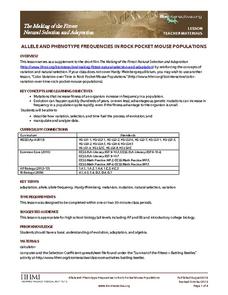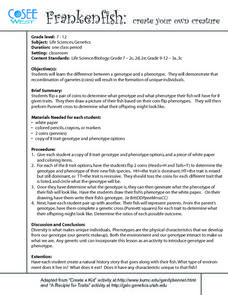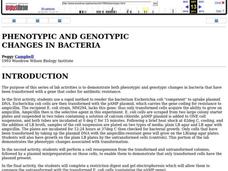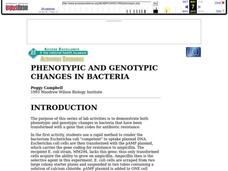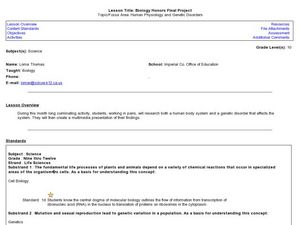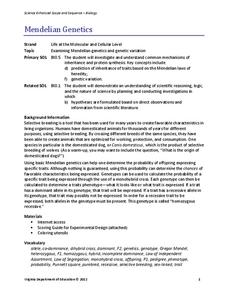Curated OER
"Easter" Egg Genetics
Using plastic Easter eggs to represent parent phenotypes, genetics enthusiasts simulate the passing of alleles. They record the phenotype of each half of the egg, one representing the mother's and one representing the father's. They...
Curated OER
Allele and Phenotype Frequencies in Rock Pocket Mouse Populations
In the deserts of Arizona and New Mexico, some tiny creatures show just how quickly natural selection can turn a mutation into an advantageous adaptation. Watch a video about rock pocket mice, who show that one small change can make all...
Curated OER
Biology-Genetics
High schoolers predict the probable mode of inheritance from a pedigree diagram showing phenotypes. They study the genetic basis for Mendel's laws of segregation and independent assortment. They give a Power Point slide show...
Curated OER
Frankenfish
Students learn the difference between a genotype and a phenotype. They demonstrate that recombination of gametes (coins) will result in the formation of unique individuals.
Curated OER
Science Lesson for Grade 12
Twelfth graders perform dihybrid crosses and calculate phenotype and genotype ratios. In this series of science lessons, 12th graders explain the process of anodizing aluminum. They research on the benefits and harm caused by resonance...
Curated OER
Phenotypic and Genotypic Changes in Bacteria
Students investigate a rapid method to render the bacterium Escherichia coli "competent" to uptake plasmid DNA. They demonstrate the phenotypic changes associated with transformation. They perform a cell resuspension from the...
Curated OER
PHENOTYPIC AND GENOTYPIC CHANGES IN BACTERIA
Students use a rapid method to render the bacterium Escherichia coli "competent" in order to uptake plasmid DNA. They also have growth on the plain LB plates by the untransformed cells (which serve as controls). Students perform a cell...
University of Colorado
Punnett Squares with Piebald Deer
Explore the science behind Earth's amazing diversity of life with this lesson on genetics. Looking at specific traits in piebald deer, carnations, and roan cattle, young scientists use Punnett...
Curated OER
Inheritance in Maize
Learners use mutant corn ears to investigate inheritance patterns. In this inheritance lesson plan, students count the number of corn kernels of each phenotype in mutant and wild type ears of corn. Learners calculate the ratio of...
Curated OER
The Spanish Omelet
Students use analogies to show the relationships among cell, nucleus, genes, chromosome, ribosome, replication, mitosis, transcription, translation, DNA, RNA, amino acids and proteins, genotype, phenotype, and genetics vs. environmental...
Curated OER
A Sputtering Image
Students explain the role of genes in heredity. In this biology activity, students predict the offspring's genotypes and phenotypes using the Punnett Square. They compute the probability of genotypes and phenotypes.
Curated OER
My Family And Me
Students create a family pedigree, relate the laws of inheritance to a family pedigree, and determine certain phenotypes and corresponding genotypes of members in their family.
Curated OER
Biology Honors Final Project
Tenth graders work on a project about cellular biology and genetics. In this biology lesson, 10th graders research about the assigned human body system and genetic disorders that affect it. They create a multimedia presentation and...
Curated OER
Making A Face
Learners are introduced to the cellular machinery assorts the pairs of chromosomes randomly and independently during meiosis. They are introduced to the rich genetic variation occurs as a result of the random and independent assortment...
Curated OER
Parental Genes
Eighth graders explore how different organisms pass their traits to their offspring. In this life science lesson plan, 8th graders differentiate recessive and dominant alleles. They predict the phenotype based on the genotype of an...
Curated OER
Genetic Phenotypes of the Super Heros
Students learn that genetic differences exist in all of us. That diversity is what makes us unique as individuals. Phenotypes are the physical characteristics that we develop from our genotype (our genetic makeup). Both the environment...
Curated OER
Dragon Genetics Lab-Principles of Mendelian Genetics
Students study genetic traits using popsicle sticks as chromosomes. In this biology lesson, students explain how traits are inherited from parents. They differentiate dominant and recessive genes.
Curated OER
Natural Selection
Young scholars practice calculating allele and genotype frequencies in the framework of a simple simulation using hard candy, calculators, and a worksheet. This lesson includes a three-page worksheet and an assessment question for...
Curated OER
Solving Genetic Puzzles
Seventh graders examine genetics combination using statistics. In this statistics lesson, 7th graders examine genetic trait using a table or punnett square to identify genotype and phenotype. This assignment requires more than one class...
Curated OER
Teacher Preparation Notes on Genetics
Students explore genetics through various hands-on activities. In this biology lesson, students predict the probability of offspring genotypes and phenotypes using the Punnett Square. They explain the causes of genetic abnormalities.
Curated OER
Dragon Genetics-Independent Assortment and Genetic Linkage
Students build chromosome models using popsicle sticks. In this biology lesson, students simulate the Law of Independent Assortment. They use Punnett squares to predict the resulting genotype and phenotype.
Curated OER
Designer Babies
Students differentiate phenotypes and genotypes. In this genetics lesson, students complete the punnett square. They design their own baby by choosing the phenotype they want.
Curated OER
Cell Reproduction and Inheritance
Students determine their inherited characteristics from their parents. In this biology instructional activity, students study the life of Mendel using an interactive website. They differentiate dominant and recessive characteristics.
Curated OER
Mendelian Genetics
Young scholars work collaboratively in small learning groups to create some representation of an aspect of Mendelian genetics in this review lesson for the Biology classroom. The lesson includes task cards for each small group and a...

